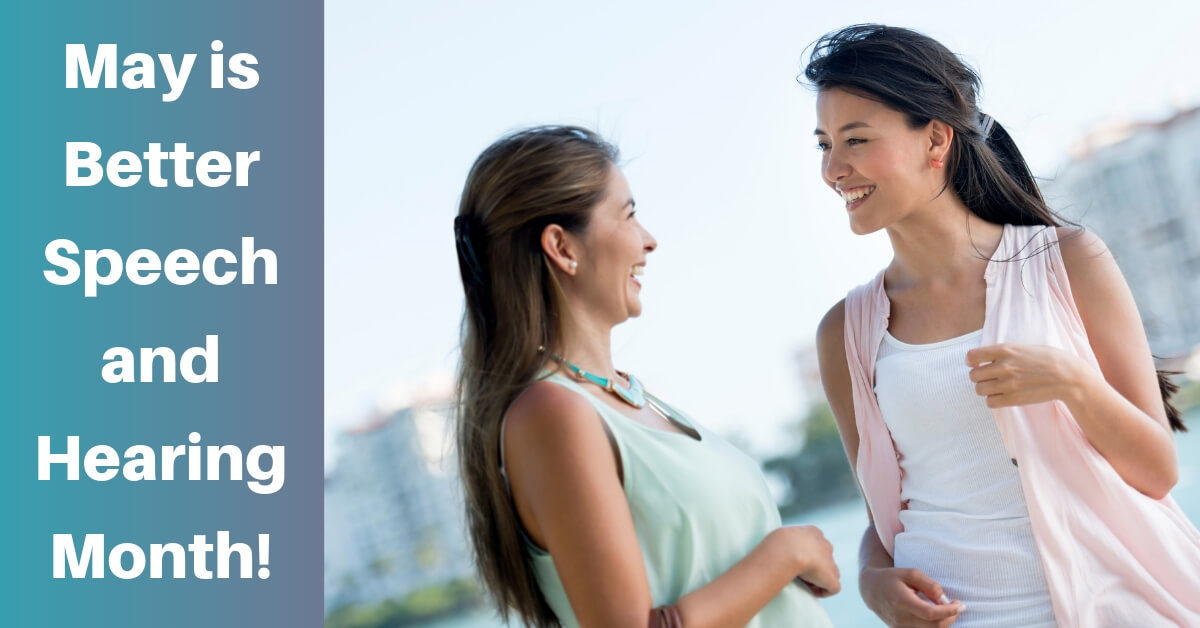Throughout the month of May, the American Speech-Language-Hearing Association of America (ASHA) wants to help you focus on the health of your hearing throughout your life. The main goal is to illuminate the public on the subject of hearing health and our need to attend to it consistently throughout our lifetime. Access to resources, trending news on hearing technologies, and a focus on treatment options are featured as part of the May month-long campaign for better speech and hearing.
Why pay attention to hearing?
As one’s hearing health declines, so does one’s ability to communicate. Hearing loss is a slow downward progression and the effects of it are slight at first. Symptoms can include the inability to differentiate speech from noise in everyday situations, straining to hear people speak and difficulty following speech when two or more people are involved. Withdrawal develops into isolation as we become less confident and tired of participating in social situations and can leave us open to depression.
Our cognitive abilities become at risk as well when we withdraw from normal social interactions.
People at risk can prevent slow cognitive decline if they get the necessary hearing implements and treatments as prescribed by hearing health professionals. Hearing decline is a condition usually attended to once permanent damage is done hence, the importance of paying attention to your ears!
Who is at risk for hearing loss?
According to the World Health Organization, by the year 2050, one in every ten people on the planet will suffer from the loss of hearing in varying degrees. Currently, over a billion people between the ages of 12 and 35 are exposed to damaging levels of noise in social settings.
For those over the age of 65, the onset of presbycusis or natural hearing loss greatly increases.
There are a variety of factors that we must take into account. For example, our genetic makeup, external environments and personal practices including diet and medications. Everyone is at risk, but not all of us are without the help that they need which is why we must be proactive!
How can technology help?
In recent years the options for those with a hearing impairment has grown tremendously.
Phone apps can help us monitor sound environments at home or at work or can be used in tandem with hearing implements for a fuller experience when communicating. In conjunction with a hearing aid or a surgical implant, the ALD or Assistive Listening device allows the user to receive amplified sounds. There are Alerting Devices available using amplified sound or lights so that we know that the fire alarm is sounding or the telephone is ringing.
There are telephones with captioning capabilities for business and personal use and relay messaging services that have progressed from live assistants to tablets laptops, text messages and virtual assistants.
The National Institute on Deafness and Other Communication Disorders (NIDCD) has teams of researchers working on cutting edge devices from personal amplification instruments to text messaging systems for groups of people to interact with in real time.
What are the benefits?
Imagine your life with less stress and strain when communicating with others, the ability to hear your favorite music clearly again, to be more confident about a business meeting, and to be closer to your loved ones in family gatherings.
Many of us are unaware of how much rigor our hearing goes through on a daily basis and are even less aware of what we need to do to rectify and prevent hearing loss. Staying vigilant can curb the process of hearing impairment and it begins with you.
Easy prevention practices
Be aware of your work and home noise levels. If you are in an environment where there is an unavoidable exposure to high levels of noise, use earplugs. Apply the same logic and technique to social activities from attending concerts to themed restaurants to snowmobiling! Constant jackhammering in your neighborhood? Walk a different route if possible.
Exiting a loud situation is the fastest solution to preventing damage to your hearing. If you use earbuds try and switch to over the ear headphones and keep to the 60/60 rule of volume at 60% for only 60 minutes a day. Using some of the techniques mentioned prior and remain mindful of what we easily take for granted: our ability to hear.
Absolute Audio
Reach out to us at Absolute Audio when you are ready to take control of your hearing health. We are here for you or a close friend or family member that show signs of hearing loss.

